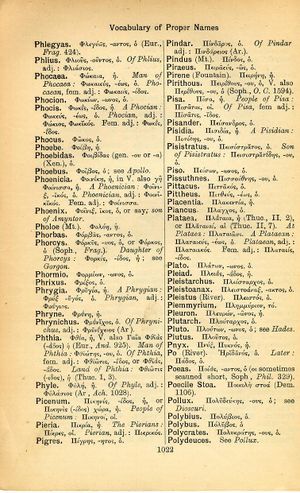Pholoe
οὐ βούλομαι δυσχερὲς εἰπεῖν οὐδὲν ἀρχόμενος τοῦ λόγου, οὗτος δ' ἐκ περιουσίας μου κατηγορεῖ → for me—but I wish to say nothing untoward at the beginning of my speech—whereas he prosecutes me from a position of advantage | but for me—I do not wish to say anything harsh at the beginning of the speech, but he prosecutes me from a position of strength
English > Greek (Woodhouse)
(Mt.) Φολόη, ἡ.
Latin > English (Lewis & Short)
Phŏlŏē: ēs, f., = Φολόη.
I A forestclad mountain in Arcadia, on the borders of Elis, Plin. 4, 6, 10, § 21; Ov. F. 2, 273; Stat. Th. 10, 228.—
II A mountain in Thessaly, the abode of the Centaurs, Luc. 3, 198; Stat. Achill. 1, 138.—Hence,
B Phŏlŏē-tĭcus, a, um, adj., of or belonging to Mount Pholoe, in Thessaly: monstra, i. e. the Centaurs, Sid. Carm. 5, 230.
Latin > French (Gaffiot 2016)
Phŏlŏē,¹³ ēs, f. (Φολόη), Pholoé
1 montagne de Thessalie, habitée par les Centaures : Luc. 3, 198
2 montagne d’Arcadie : Ov. F. 2, 273 ; Plin. 4, 21 || -ētĭcus, a, um, du mont Pholoé : Sid. Carm. 5, 230.
Latin > German (Georges)
Pholoē, ēs, f. (Φολόη), ein waldreiches Gebirge in Arkadien auf der Grenze von Elis, die südl. Fortsetzung des Erymanthus, j. Olono, Ov. fast. 2, 273. Stat. Theb. 10, 228. Plin. 4, 21: Wohnsitz der Zentauren, Lucan. 3, 198. Stat. Ach. 1, 238. – Dav. Pholoēticus, a, um, pholoëtisch, monstra, die Zentauren, Sidon. carm. 5, 230.

